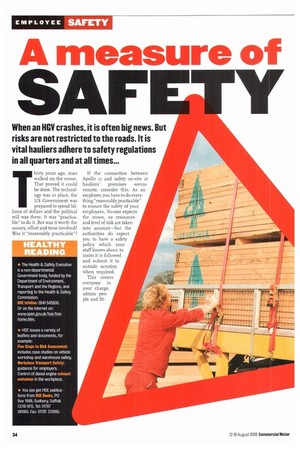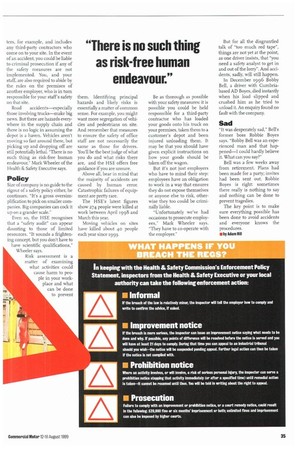A measure of
Page 36

Page 37

If you've noticed an error in this article please click here to report it so we can fix it.
SAIF
When an HGV crashes, it is often big news. But risks are not restricted to the roads. It is vital hauliers adhere to safety regulations in all quarters and at all times...
Thirty years ago, man walked on the moon. That proved it could be done. The technology was in place, the US Government was prepared to spend billions of dollars and the political will was there. It was "practicable" to do it. But was it worth the money, effort and time involved? Was it "reasonably practicable"?
If the connection between Apollo ii and safety on-site at hauliers' premises seems remote, consider this. As an employer, you have to do everything "reasonably practicable" to ensure the safety of your employees. No-one expects the moon, so resources and level of risk are taken into account—but the authorities do expect you to have a safety policy which your staff knows about, to insist it is followed and submit it to outside scrutiny when required.
This covers everyone in your charge, admin people and fit ters, for example, and includes any third-party contractors who come on to your site. In the event of an accident, you could be liable to criminal prosecution if any of the safety measures are not implemented. You, and your staff, are also required to abide by the rules on the premises of another employer, who is in turn responsible for your staffs safety on that site.
Road accidents—especially those involving trucks—make big news. But there are hazards everywhere in the supply chain and there is no logic in assuming the depot is a haven. Vehicles aren't moving so fast around there, but picking up and dropping off are still potentially lethal. "There is no such thing as risk-free human endeavour," Mark Wheeler of the Health & Safety Executive says.
Policy
Size of company is no guide to the rigour of a safety policy either, he continues. "It's a gross oversimplification to pick on smaller companies. Big companies can cock it up on a grander scale."
Even so, the HSE recognises that a "safety audit" can appear daunting to those of limited resources. "It sounds a frightening concept, but you don't have to have scientific qualifications," Wheeler says.
Risk assessment is a matter of examining what activities could cause harm to people in your workplace and what can be done to prevent
them. Identifying principal hazards and likely risks is essentially a matter of common sense. For example, you might want more segregation of vehicles and pedestrians on site. And remember that measures to ensure the safety of office staff are not necessarily the same as those for drivers. You'll be the best judge of what you do and what risks there are, and the HS E offers free guidance if you are unsure.
Above all, bear in mind that the majority of accidents are caused by human error. Catastrophic failures of equipment are pretty rare.
The H SE's latest figures show 274 people were killed at work between April 1998 and March this year.
Moving vehicles on sites have killed about 40 people each year since 5993. Be as thorough as possible with your safety measures: it is possible you could be held responsible for a third-party contractor who has loaded your goods onto his truck on your premises, taken them to a customer's depot and been injured unloading them. It may be that you should have given explicit instructions on how your goods should be taken off the wagon.
But it's not just employers who have to mind their step: employees have an obligation to work in a way that ensures they do not expose themselves or anyone else to risk, otherwise they too could be criminally liable.
"Unfortunately we've had occasions to prosecute employees," Mark Wheeler says. "They have to co-operate with the employer." But for all the disgruntled talk of "too much red tape", things are not yet at the point, as one driver insists, that "you need a safety analyst to get in and out of the lorry". And accidents, sadly, will still happen.
In December 1996 Bobby Bell, a driver with Cumbriabased AD Boyes, died instantly when his load slipped and crushed him as he tried to unload it. An enquiry found no fault with the company.
Sad
It was desperately sad," Bell's former boss Robbie Boyes says. "Bobby Bell was an experienced man and that happened—I could hardly believe it. What can you say?"
Bell was a few weeks away from retirement. Plans had been made for a party; invites had been sent out. Robbie Boyes is right: sometimes there really is nothing to say and nothing can be done to prevent tragedies.
The key point is to make sure everything possible has been done to avoid accidents and everyone knows the procedures.
Miry Adam NI








































































































